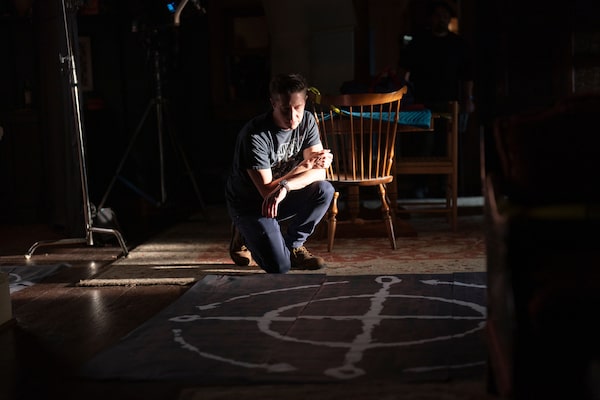
Director David Gordon Green on the set of The Exorcist: Believer.Eli Joshua Adé/The Associated Press
If you’re a film producer with a dormant horror franchise collecting dust instead of box-office receipts, your first call might be to David Gordon Green.
The American filmmaker, who burst onto the indie scene with the 2000 drama George Washington, has been carving out an unpredictable career path for the past two decades, going from low-fi character pieces (All the Real Girls) to stoner flicks (Pineapple Express, Your Highness) to top-tier HBO comedies (Eastbound & Down, The Righteous Gemstones).
Now, though, Green has landed as the industry’s go-to horror resuscitator after rebooting the Halloween franchise a few years back, and this week relaunching the Exorcist series with the first film of a planned trilogy (and, like his Halloween films, bringing back the original star of the series, in this case Ellen Burstyn).
Ahead of this week’s release of The Exorcist: Believer, Gordon Green spoke with The Globe and Mail about the terrifying expectations that come with revisiting horror icons.
Your career path is hard to nail down, but now that you’ve tackled two horror franchises, is it fair to say that this genre was what you’ve been trying to build toward?
It wasn’t a goal of mine as a filmmaker, but these were amazing opportunities to take characters from beloved mythologies and have your way with them. It’s an incredible privilege. Some filmmakers will lean toward big comic-book movies or Star Wars, and that’s cool, but I’m trying to take these titles that are of significance in culture and bring things that are meaningful to me into them. These aren’t big committee movies with a lot of gatekeepers. We get to do what we want and have fun.
Both here with The Exorcist and in Halloween, you’ve made films that ignore all the sequels that came after the original films. Was that essential to getting you involved – that you don’t have to worry about what others have done with the properties since?
It was essential in Halloween because there were a lot of choices that I didn’t like, and I didn’t want to be held captive to them. With The Exorcist, I just don’t know those movies very well. I have an appreciation that they exist, particularly Exorcist II: The Heretic, which is ballsy. But I just didn’t acknowledge it, if that makes sense.
I suppose there’s not as much responsibility with The Exorcist as there is with Halloween’s Michael Myers, who is a figure that people are attached to. The Exorcist’s demon Pazuzu is an entity, a force, not a guy who kids buy masks or action figures of.
That’s right – for me, demonology is a vast universe in its own and that’s not intellectual property, it’s just what’s out there. It’s fun being on my own journey of research and splintering off from Pazuzu. Our demon is different. Much like [original Exorcist director William Friedkin] isn’t spelling out who you’re dealing with and how it possessed Regan, we’re riding that ambiguity ourselves.
When you made Halloween, you said you checked in with original director John Carpenter constantly. Did you have any conversations with Friedkin before he died this summer?
I didn’t, and I’m very sad because I had been told that he would watch the film when it was completed. But he was not interested in being involved in it. I reached out to Ellen Burstyn to be my guide post and creative guru on this one, and she’s become an amazing collaborator and friend. And Linda Blair was a consultant to help us navigate the well-being of our young actresses.
What is the process like between you and Danny McBride on these films? When you think of you guys, horror franchises don’t immediately come to mind.
Danny and I have been movie geeks since we went to film school in North Carolina 25 years ago. We’re always there to push each other, dare each other to take bigger swings. Just before we did Halloween Ends, we were engaging on Believer. I looked at him and asked if we really wanted to jump into another horror franchise? He said, “Why would you not?” With Righteous, we get to play and have a laugh, then we get to dive into these legacy horror projects. There is an incredible fan base for these movies, and you can’t listen to everyone. You have to trust yourself and your inner circle. Otherwise you’ll go crazy trying to make everybody happy.
So is Pinhead next? Leatherface?
I don’t even know where we’ll be three weeks from now. We’ll see what the performance of this movie says about our fate. But I don’t look at it in genre terms of what I’m willing to engage on. Someone the other day sent me a pitch about a documentary, which is something I’ve never done before – that’s scary to me. Yesterday, though, I saw someone wear a Re-Animator T-shirt and I wondered why that hasn’t been revisited. But that’s something for somebody else.
Re-animating Re-Animator seems like it writes itself.
Yeah, exactly. Let’s go find a guy for that and remake it!
This interview has been condensed and edited.
 Barry Hertz
Barry Hertz